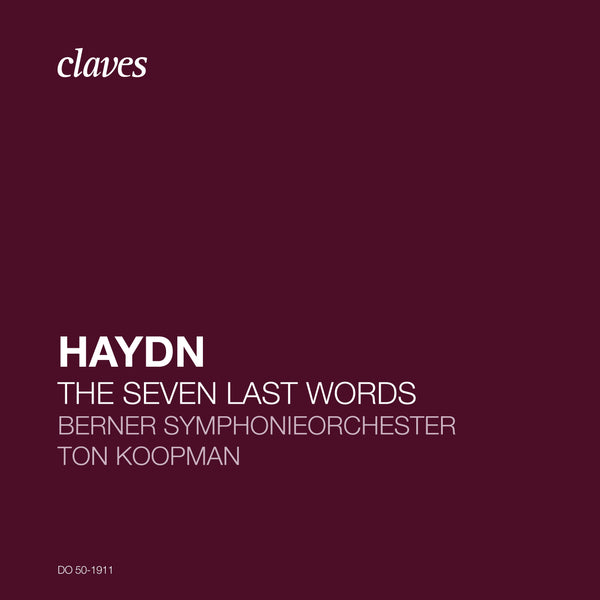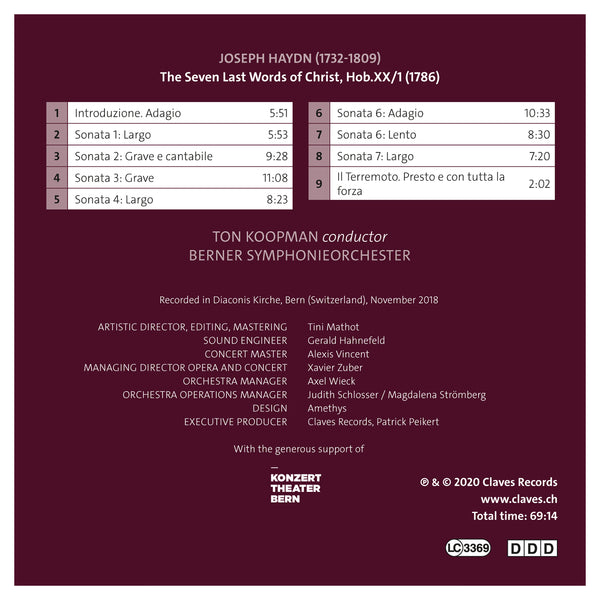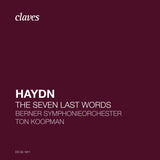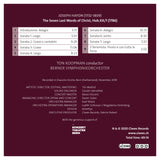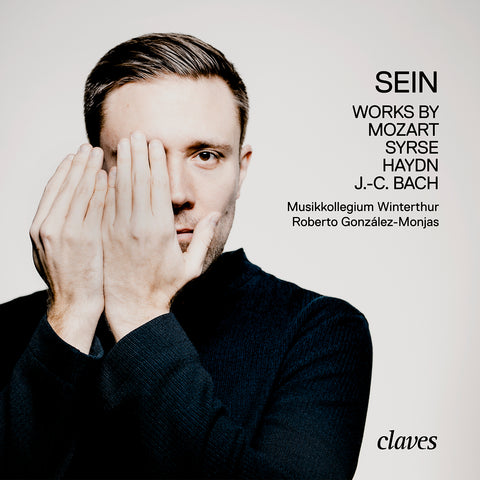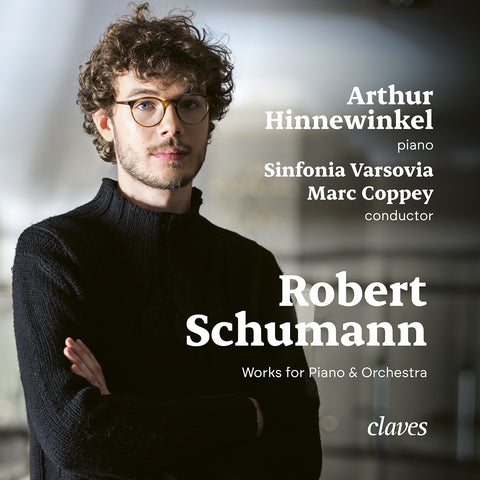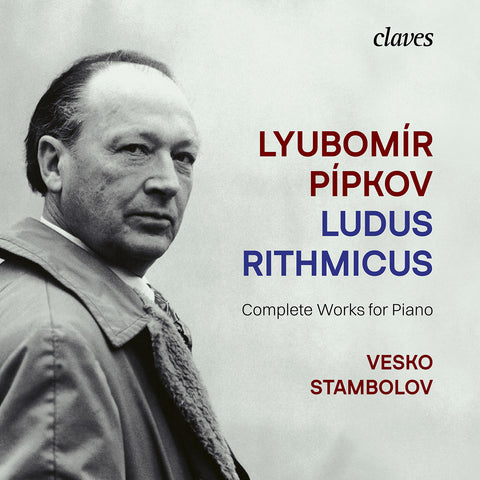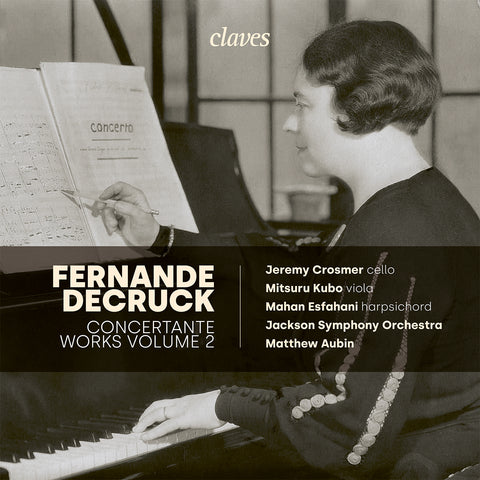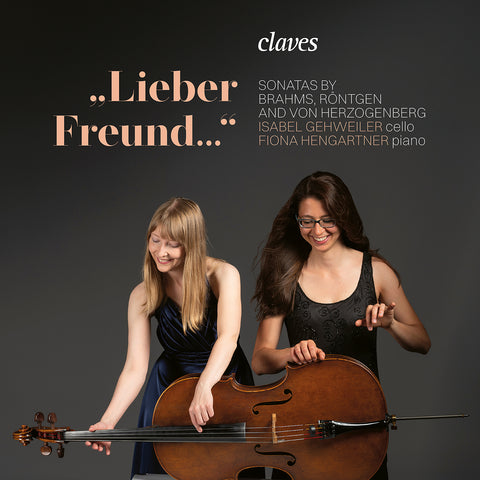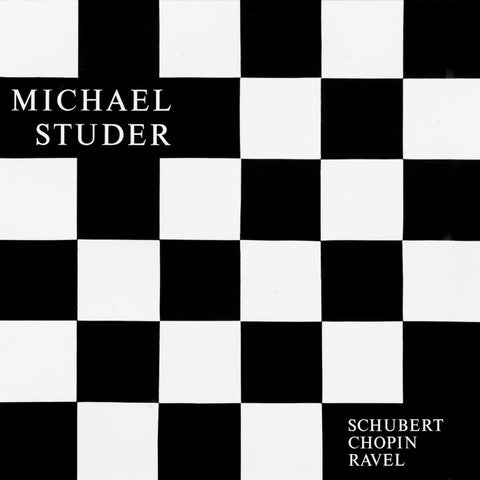(2020) Joseph Haydn: The Seven Last Words of Christ, Hob.XX/1
Kategorie(n): Orchester Repertoire
Hauptkomponist: Joseph Haydn
Orchester: Berner Symphonieorchester
Dirigent: Ton Koopman
CD-Set: Digital only
Katalog Nr.:
DO 1911
Freigabe: 10.04.2020
EAN/UPC: 7619931191126
Sie können dieses Album auch online über die folgenden Links finden:
Dieses Album ist jetzt neu aufgelegt worden. Bestellen Sie es jetzt zum Sonderpreis vor.
CHF 0.00
Dieses Album ist nicht mehr auf CD erhältlich.
Dieses Album ist noch nicht veröffentlicht worden. Bestellen Sie es jetzt vor.
CHF 0.00
Dieses Album ist nicht mehr auf CD erhältlich.
Inklusive MwSt. für die Schweiz und die EU
Kostenloser Versand
Dieses Album ist jetzt neu aufgelegt worden. Bestellen Sie es jetzt zum Sonderpreis vor.
CHF 0.00
Dieses Album ist nicht mehr auf CD erhältlich.
This album has not been released yet.
Pre-order it at a special price now.
CHF 0.00
Dieses Album ist nicht mehr auf CD erhältlich.
SPOTIFY
(Verbinden Sie sich mit Ihrem Konto und aktualisieren die Seite, um das komplette Album zu hören)
JOSEPH HAYDN: THE SEVEN LAST WORDS OF CHRIST, HOB.XX/1
C’était un rêve de l’actuel directeur du label Claves : enregistrer son œuvre préférée entre toutes, dans sa version originale et avec un pionnier de l’interprétation baroque, Ton Koopman.
Œuvre de grande maturité de Joseph Haydn, les sept dernières paroles ont été commandées par l’Oratoire de la Sainte Grotte à Cadix, pour son inauguration en 1786, lors du Vendredi Saint.
Haydn raconte les circonstances particulières de la création : dans une église drapée de noir, le prêtre annonce chaque parole puis se prosterne pendant chaque sonate.
L’œuvre est entourée d’une introduction méditative et d’un tremblement de terre apocalyptique. Au centre, se succèdent sept mouvements lents en forme de sonate ou l’on retrouve la veine du jeune Haydn Sturm und Drang et sa maturité mise en lumière par ses futurs proches triomphes londoniens dès 1791.
Ton Koopman, champion de l’enregistrement intégral des cantates de Bach et de Buxtehude, a souvent abordé Haydn et ses symphonies mais c’est bien la première fois qu’il grave les sept dernières paroles, en compagnie d’un orchestre de belle tradition, le Berner Symphonieorchester.
Patrick Peikert
ENG
This was the dream of the current director of the Claves label: to record his favourite work ever, in its original version and with a pioneer of Baroque interpretation, Ton Koopman.
One of Joseph Haydn's most mature works, The Seven Last Words were commissioned by the Holy Cave Oratory in Cadiz, for its inauguration in 1786, on Good Friday.
Haydn told of the particular circumstances of the creation: in a church shrouded in black, the priest proclaimed each word and then prostrated himself during each sonata.
The work is surrounded by a meditative introduction and an apocalyptic earthquake. In the centre, seven slow movements in sonata form follow one another, in which we find the young Haydn's Sturm und Drang vein and his maturity brought to light by his imminent London triumphs from 1791 onwards.
Ton Koopman, master of the complete recording of Bach and Buxtehude cantatas, often approached Haydn and his symphonies, but this is indeed the first time that he has recorded The Seven Last Words, together with an orchestra of great tradition, the Berner Symphonieorchester.
Translated from French by Isabelle Watson
(2020) Joseph Haydn: The Seven Last Words of Christ, Hob.XX/1 - DO 1911
C’était un rêve de l’actuel directeur du label Claves : enregistrer son œuvre préférée entre toutes, dans sa version originale et avec un pionnier de l’interprétation baroque, Ton Koopman.
Œuvre de grande maturité de Joseph Haydn, les sept dernières paroles ont été commandées par l’Oratoire de la Sainte Grotte à Cadix, pour son inauguration en 1786, lors du Vendredi Saint.
Haydn raconte les circonstances particulières de la création : dans une église drapée de noir, le prêtre annonce chaque parole puis se prosterne pendant chaque sonate.
L’œuvre est entourée d’une introduction méditative et d’un tremblement de terre apocalyptique. Au centre, se succèdent sept mouvements lents en forme de sonate ou l’on retrouve la veine du jeune Haydn Sturm und Drang et sa maturité mise en lumière par ses futurs proches triomphes londoniens dès 1791.
Ton Koopman, champion de l’enregistrement intégral des cantates de Bach et de Buxtehude, a souvent abordé Haydn et ses symphonies mais c’est bien la première fois qu’il grave les sept dernières paroles, en compagnie d’un orchestre de belle tradition, le Berner Symphonieorchester.
Patrick Peikert
ENG
This was the dream of the current director of the Claves label: to record his favourite work ever, in its original version and with a pioneer of Baroque interpretation, Ton Koopman.
One of Joseph Haydn's most mature works, The Seven Last Words were commissioned by the Holy Cave Oratory in Cadiz, for its inauguration in 1786, on Good Friday.
Haydn told of the particular circumstances of the creation: in a church shrouded in black, the priest proclaimed each word and then prostrated himself during each sonata.
The work is surrounded by a meditative introduction and an apocalyptic earthquake. In the centre, seven slow movements in sonata form follow one another, in which we find the young Haydn's Sturm und Drang vein and his maturity brought to light by his imminent London triumphs from 1791 onwards.
Ton Koopman, master of the complete recording of Bach and Buxtehude cantatas, often approached Haydn and his symphonies, but this is indeed the first time that he has recorded The Seven Last Words, together with an orchestra of great tradition, the Berner Symphonieorchester.
Translated from French by Isabelle Watson
Return to the album | Composer(s): Joseph Haydn | Main Artist: Ton Koopman






